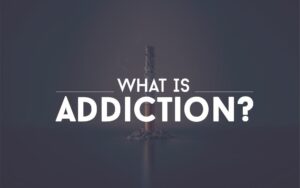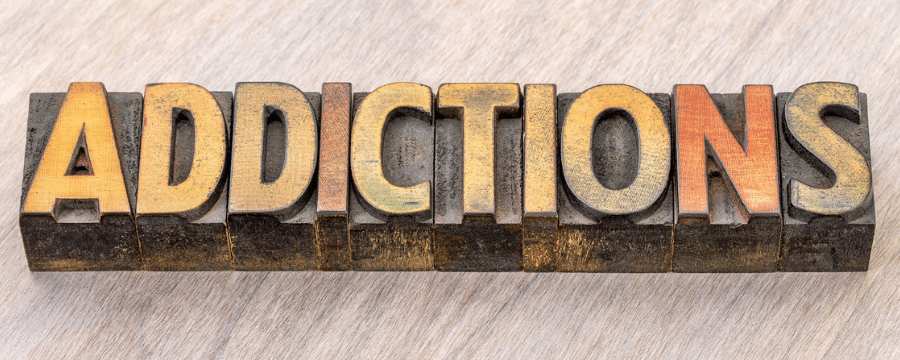Addiction is a multifaceted and often misunderstood phenomenon that permeates various aspects of human life. From substance abuse to behavioral dependencies, addiction manifests in diverse forms, each with its unique challenges and consequences. In this blog, we delve into the intricacies of addiction, exploring different types of addiction, and the impact it has on individuals and society at large.
Contents
What is Addiction?
 Addiction is a powerful condition where someone feels an uncontrollable urge to do or take something, even when it might harm them. It’s like a strong pull that can be hard to resist, whether it’s drugs, alcohol, gambling, or even activities like gaming or shopping. When someone becomes addicted, their brain gets rewired in a way that makes them crave whatever they’re addicted to. And they might keep doing it even if they know it’s bad for them.
Addiction is a powerful condition where someone feels an uncontrollable urge to do or take something, even when it might harm them. It’s like a strong pull that can be hard to resist, whether it’s drugs, alcohol, gambling, or even activities like gaming or shopping. When someone becomes addicted, their brain gets rewired in a way that makes them crave whatever they’re addicted to. And they might keep doing it even if they know it’s bad for them.
People can get addicted to lots of different things, and addiction can affect anyone, regardless of their age, gender, or background. It’s not just about enjoying something too much – addiction can take over a person’s life. Hence, making it tough for them to stop, even if they want to.
What Are The Most Common Types Of Addiction?
Certainly, types of addiction can manifest in various forms, affecting individuals in different ways. Here are different types of addiction:
Substance Addiction
This includes addiction to substances like alcohol, nicotine, opioids, cocaine, and other drugs. Substance addiction often begins with experimentation or recreational use but can quickly spiral into dependence, where the individual feels a compelling need to use the substance regularly. Over time, substance addiction can lead to serious health issues, relationship problems, and legal troubles.
Alcohol Addiction
Alcohol addiction, also known as alcoholism, is a specific form of substance addiction characterized by a compulsive need to consume alcohol despite negative consequences. It can lead to physical dependence, tolerance, and withdrawal symptoms when trying to stop drinking. Alcohol addiction can impact various aspects of life, from work and relationships to physical and mental health.
Nicotine Addiction
This type of addiction primarily stems from the use of tobacco products like cigarettes, cigars, and chewing tobacco. Nicotine is highly addictive, and regular use can lead to dependence. Quitting nicotine can be challenging due to withdrawal symptoms like irritability, anxiety, and cravings.
Drug Addiction
 This addiction encompasses a wide range of substances, including prescription medications (e.g., opioids, benzodiazepines), illicit drugs (e.g., heroin, methamphetamine), and synthetic compounds (e.g., synthetic cannabinoids). Drug addiction alters brain chemistry, leading to compulsive drug-seeking behavior and significant disruptions in daily functioning.
This addiction encompasses a wide range of substances, including prescription medications (e.g., opioids, benzodiazepines), illicit drugs (e.g., heroin, methamphetamine), and synthetic compounds (e.g., synthetic cannabinoids). Drug addiction alters brain chemistry, leading to compulsive drug-seeking behavior and significant disruptions in daily functioning.
Gambling Addiction
Gambling addiction, also known as gambling disorder, involves persistent and recurrent problematic gambling behavior that disrupts personal, social, or vocational pursuits. Individuals with gambling addiction may experience a preoccupation with gambling, increasing the frequency and intensity of bets to chase losses, jeopardizing financial stability and relationships in the process.
Internet Addiction
Internet addiction, also referred to as problematic internet use or internet gaming disorder, involves excessive and compulsive internet usage that interferes with daily life responsibilities and activities. It can manifest in various forms, including excessive gaming, social media use, online shopping, or compulsive browsing. And, leading to negative consequences such as sleep disturbances, social isolation, and decreased productivity.
Food Addiction
Food addiction involves an unhealthy relationship with food, characterized by compulsive overeating or binge eating. Individuals with food addiction may experience a loss of control over their eating habits, consuming large quantities of food even when not physically hungry. This addiction can lead to obesity, diabetes, heart disease, and emotional distress.
Sexual Addiction
Sexual addiction, also known as hypersexuality or compulsive sexual behavior, involves engaging in sexual activities excessively and persistently, despite negative consequences. Individuals with sexual addiction may experience an inability to control their sexual impulses. Thus, leading to risky behaviors, relationship conflicts, and feelings of shame or guilt.
These are just a few examples of common types of addiction, each with its unique challenges and impacts on individuals’ lives. It’s essential to recognize the signs of addiction and seek appropriate support and treatment when needed.
What Are The 10 Stages Of Addiction?
 Addiction is a complex process that typically progresses through various stages. While the exact stages may vary depending on the model used, here are ten common stages often associated with addiction.
Addiction is a complex process that typically progresses through various stages. While the exact stages may vary depending on the model used, here are ten common stages often associated with addiction.
10 Stages
The most common stages are below listed for more clearer understanding:
Experimentation
This initial stage involves trying a substance or engaging in a behavior out of curiosity or peer influence. At this point, there may not be any significant consequences, and the individual may not consider the behavior as problematic.
Regular Use
In this stage, the individual begins to use the substance or engage in the behavior more frequently. It becomes a regular part of their routine, and they may start to experience some initial effects or benefits.
Social or Recreational Use
The substance or behavior is now integrated into social activities or recreational settings. It may be seen as a way to relax, socialize, or cope with stress.
Problem or Risky Use
At this stage, the individual’s use of the substance or behavior starts to pose risks or problems. They may experience negative consequences such as health issues, relationship problems, or legal troubles, but they continue to engage in the behavior despite these consequences.
Dependence
Dependence develops as the individual’s body adapts to the substance, leading to tolerance and withdrawal symptoms. They may need increasing amounts of the substance to achieve the desired effects and experience discomfort or cravings when they try to cut down or stop.
Craving and Preoccupation
Cravings become intense and frequent, dominating the individual’s thoughts and motivations. They may spend a significant amount of time planning, obtaining, and using the substance or engaging in the behavior.
Loss of Control
Despite repeated attempts to cut down or control their use, the individual finds it increasingly difficult to resist the urge to use the substance or engage in the behavior. They may feel powerless to stop, even when they recognize the harm it causes.
Negative Consequences
The negative consequences of addiction become more severe and pervasive, affecting various areas of the individual’s life such as physical health, mental well-being, relationships, finances, and work or school performance.
Desperation
As the addiction progresses, the individual may experience feelings of desperation, hopelessness, and despair. They may engage in risky or self-destructive behaviors to maintain their addiction, despite knowing the consequences.
Rock Bottom or Crisis
This stage is characterized by a significant crisis or rock bottom moment that forces the individual to confront the reality of their addiction. It may involve a major health scare, loss of important relationships, legal issues, or other serious consequences that prompt them to seek help or make changes.
It’s important to note that not everyone progresses through these stages in the same way or at the same pace. And some individuals may experience relapses or setbacks along the way.
What Are the Consequences Of Addiction?
Addiction can have profound consequences that impact every aspect of an individual’s life, as well as the lives of those around them. Here are some common consequences of addiction:
- Health Effects
Addiction can lead to a range of physical and mental health problems, including organ damage, infectious diseases (e.g., HIV/AIDS, hepatitis), respiratory issues, cardiovascular problems, neurological disorders, mental health disorders (e.g., anxiety, depression), and increased risk of overdose or death.
- Relationship Problems
Addiction often strains relationships with family members, friends, romantic partners, and colleagues. Individuals may experience conflicts, betrayal, broken trust, and isolation due to their addictive behaviors. Family dynamics may be disrupted, and children of addicted individuals may experience neglect, abuse, or instability.
- Financial Hardship
Addiction can be financially draining, as individuals may spend substantial amounts of money on substances or behaviors despite financial obligations. This can lead to debt, bankruptcy, loss of assets, and legal issues related to theft, fraud, or unpaid bills.
- Employment and Educational Issues
Addiction can impair work or school performance, leading to absenteeism, poor productivity, disciplinary actions, demotions, job loss, expulsion, or academic failure. This can jeopardize financial stability, career advancement, and educational opportunities.
- Social Isolation
Addiction can lead to social withdrawal and isolation as individuals prioritize their addictive behaviors over relationships and social activities. They may lose interest in hobbies, events, or gatherings that do not involve substance use or addictive behaviors, leading to loneliness and disconnection from support networks.
- Loss of Identity and Purpose
Addiction can erode individuals’ sense of self-worth, identity, and purpose as they become consumed by their addictive behaviors. They may lose sight of their values, goals, and aspirations, feeling trapped in a cycle of addiction with no clear path forward.
Seeking timely intervention and support is crucial to address addiction and mitigate its adverse effects.
How To Deal With The Types Of Addiction?
 Managing types of addiction involves a multifaceted approach. Here are some general principles for dealing with various types of addiction:
Managing types of addiction involves a multifaceted approach. Here are some general principles for dealing with various types of addiction:
- Seek Professional Help: Encourage individuals struggling with addiction to seek support from healthcare professionals, therapists, counselors, or addiction specialists.
- Join Support Groups: Participating in support groups such as Alcoholics Anonymous (AA), Narcotics Anonymous (NA), Gamblers Anonymous (GA), or other peer-led support networks can provide individuals with a sense of community.
- Develop Coping Skills: Teach individuals healthier coping mechanisms to manage stress, cravings, and triggers without resorting to addictive substances or behaviors. This may include mindfulness, relaxation techniques, exercise, hobbies, or creative outlets.
- Establish Boundaries: Set clear boundaries and consequences with individuals struggling with addiction to protect oneself and encourage accountability. This may involve establishing rules regarding substance use, financial assistance, or enabling behaviors.
- Develop Relapse Prevention Strategies: Help individuals identify triggers, high-risk situations, and warning signs of relapse, and assist them in developing effective coping strategies.
- Encourage Healthy Lifestyle Changes: Promote holistic well-being by encouraging individuals to adopt healthier lifestyle habits. This might include balanced nutrition, regular exercise, adequate sleep, and engaging in activities.
These strategies, when implemented effectively and compassionately, can contribute to a more comprehensive and supportive approach.
Conclusion
In conclusion, addiction is a complex and pervasive issue that affects individuals, families, and communities worldwide. From substance abuse to behavioral dependencies, addiction manifests in various forms, each with its unique challenges and consequences. By understanding the different types of addiction and the strategies available to address them, we can work towards fostering empathy and providing support.
Through education, awareness, and a commitment to compassion, we can empower individuals struggling with addiction to seek help, overcome barriers, and reclaim control of their lives.
